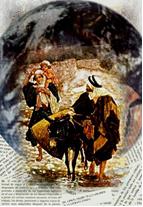Sunday, 29 December 2013-12-20
SAINT JOSEPH’S DREAM and THE FLIGHT INTO EGYPT
Mt. 2, 13-15; 19-23

“Go often to Nazareth and contemplate!” That is the frequently repeated invitation of Pierre Bienvenu Noailles.
And today, in a special way, we can pause to contemplate St. Joseph’s 'dream’ and the flight into Egypt.
In the text of the Mass, Matthew speaks to us of Jesus through Joseph. The evangelist, St. Luke, focuses more
on Mary while Matthew focuses on Joseph.
This account reveals to us the context in which the life of the whole family takes place: in insecurity and persecution
because of Herod who, jealous of his power, acts with evident cruelty. He relates the flight into Egypt.
However, this also introduces us to the level of a biblical faith experience connected to the history of salvation:
the affirmation that Jesus is the promised Messiah. Egypt is not only a geographical location but also a theological place; in Egypt the people had the experience of slavery and also of liberation. Jesus saw what the people
of Israel had lived and recapitulates in himself the history of Israel initiating a new exodus and echoing the hope of the prophets who announced the final salvation (Hosea 11, 1-4; Jeremiah 31).
We are faced once more with a text that utilises the stereotypical mode of the “angel of the Lord” who speaks
to Joseph “in a dream”. It is a method widely used in the Bible to express the relationship with God, the faith experience of the people.
Joseph’s experience shows us two aspects that we cannot separate and which are: the reality of living in a context
of oppression and persecution that necessitates flight for the sake of security and the aspiration, his heart’s desire concerning his life project. It is not difficult to imagine that from the beginning of his visits with
Mary, Joseph “dreamed” of other horizons for himself and his family that, as time went on, were shattered. However, these dreams vanished to give way to an attitude of detachment from his “own dreams”, an attitude
lived between fear and courage to go forward trusting faithfully in the promise of God for his people.
Jesus did not live solely in the bosom of a small family unit, united with his parents, but was also integrated
into a much wider family. His destiny and his hope were the destiny and hope of all. To do this, by assuming the risk with decisiveness and hope, he united his destiny and that of his family to the destiny of the people and
undertook a path towards a land and a life better for all. With the large Family of God, Jesus, Mary and Joseph lived in their own flesh the sorrow of migration and its consequences.
Joseph, by taking the way of the “exodus”, secured the life of Jesus and Mary but, because of that, the whole
family was to begin the hard road of difficulties and trials. The one who set up his tent among us accepted to go through the stages of every creature from birth to a death that would engender new life.
We are before an experience that has evident resonances in our world today. Migration traverses human history:
displacement because of war, famine, persecution, etc. Today, we continue to dream of “a new heaven and a new earth” (Revelations 21, 1).
We experience in a special way today the urgency of setting out. Let us dare to take concrete steps, aware that
it requires us to enter into a “paschal path that implies letting go and receiving, that involves dying to open ourselves to abundant life” (Corporate Commitment, General Chapter 2008).
Marie Carmen VILARDELL
